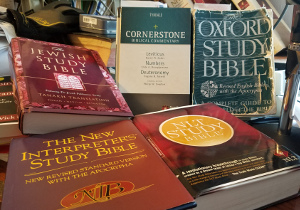Deuteronomy and Introductions Redux
 A second law and a second note on introductions to biblical books. Goes together, no?
A second law and a second note on introductions to biblical books. Goes together, no?
I completed my reading of Numbers along with the Cornerstone Biblical Commentary yesterday and today read the introduction from the section on Deuteronomy. In it the author, Eugene H. Merrill (professor at Dallas Theological Seminary) argues forcefully for Mosaic authorship and for an early (1446 BC) date for the exodus. In school I learned 1445, but the majority position is that the exodus occurred in the mid to late 13th century, and critical scholars in general would reject at least direct Mosaic authorship in favor of a date of writing in the 7th century BC.
In the course of presenting these positions and his basis for them he makes the statement (p. 449) that “there is absolutely no objective evidence that compels a late provenance for the book.” I would first point out that it is useful to realize that evidence rarely compels, especially in historical situations such as this. Secondly, there is evidence that would point to the composite nature of the book and some that would suggest a later historical setting. Certain Merrill, along with many others, has provided explanations for this apparent evidence, but having provided an alternate explanation, however convincing it may be to the one providing it, does not make the evidence go away.
[ncs_ad pid=’9780842334280′ float=’right’ adtype=’aer.io’]I like to look at introductions in various study Bibles. I’m not sure why, as the usual result is simply to raise my blood pressure a bit. In this case I have at hand The Oxford Study Bible, The Jewish Study Bible, The New Interpreter’s Study Bible, and the NLT Study Bible. Out of these, only the NLT Study Bible would tend to agree with Merrill. That count is not important, however, because it doesn’t constitute a good survey of quality scholarship on the issue.
The problem with the lot of these is that they each assert their position with confidence and provide a couple of notes on things that favor that position, but give very few reasons why anyone might disagree. If you read the conservative introductions, you might well conclude that the critical scholars who disagree are just perverse, while if you read the more critical introductions, you might not be aware that there are modern conservative scholars who would hold to such views as a 1446 BC date for the exodus or Mosaic authorship of Deuteronomy around 1406 BCE.
You may think I’m being unfair, as each introduction must be short, especially in the study Bibles. Merrill’s can be somewhat longer as he is writing for a substantial commentary on just three books of the Bible. But my point is not to chastise the scholars for their positions or for espousing them in their introductions. I do find their language a bit intemperate, and I would also point out that it doesn’t take many words to indicate that other scholars disagree with at least some indication of why that might be.
My interest is in what you do about it. I’d suggest strongly that you don’t surround yourself with books that agree with you and that come from scholars that are in your own religious/denominational tradition. I am generally convinced, though I wouldn’t use “compelling” for any evidence, that the Pentateuch, including Deuteronomy, is a composite text containing some ancient traditions, but built up with case law and later additions and adaptations. Yet I will carefully read Merrill’s commentary as I also read through the Hebrew text. What’s more, I can predict right now that I will learn a great deal from Merrill’s work.
The reason I can do that is that I’ve read this introduction, and while I disagree with the dating and authorship section, it is followed by a discussion of structure and themes that is extremely helpful. I frequently encounter the idea that a certain writer is just a liberal, or too conservative for me, so why should I read his material. We could go for “iron sharpens iron” (Proverbs 27:17). But I think perhaps Provebers 27:21 is better:
The crucible is for silver, and the furnace is for gold,
so a person is tested by being praised. (NRSV)
Or as I translated it for a Tweet (I like literal in this type of poetry):
As refining fire for silver,
As a furnace for gold,
So to a man is a voice praising him (Prov. 27:21).— Henry Neufeld (@hneufeld) June 19, 2016
I really need to read someone saying that there is “no compelling evidence” for the position I hold. If I only read The Oxford Study Bible, The Jewish Study Bible, and The New Interpreter’s Study Bible, I would never be pushed to look more closely at the evidence.
I think it is particularly important in using study Bibles, because people seem to get the idea that whatever is in the notes is what “scholars” believe regarding the passage. They often also decide that if “scholars” believe it, then they must too. But scholars as a group rarely agree on anything. It’s one of their best features, because they all want to refine things and find some new, good ideas. The results are sometimes crazy, but nothing like as bad as the results of not doing so.
Introductions are hard to write and often don’t prove that useful. But using a range of them can be quite enlightening!



